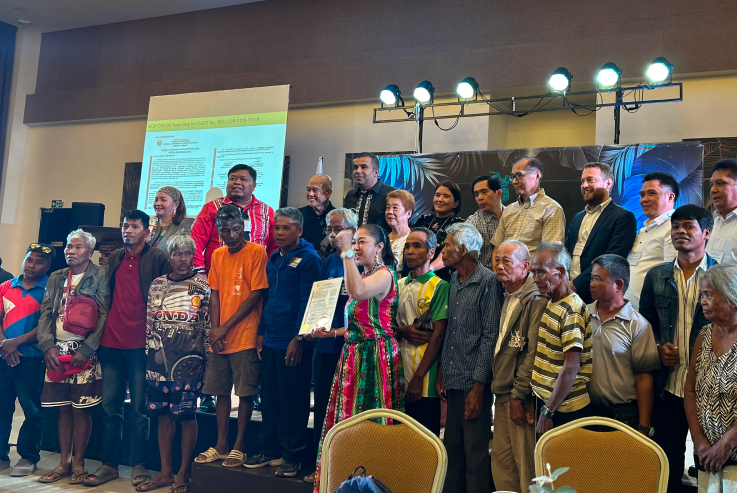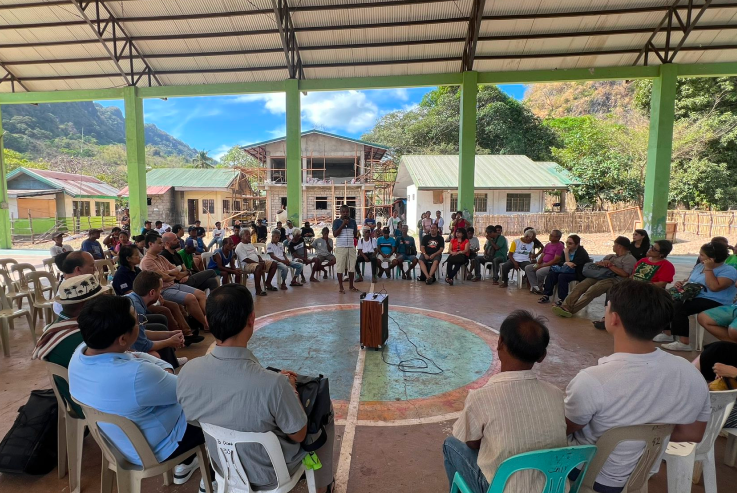Tabganua Calamian community meeting Coron Phililipines - Photo credit: National Commission on Indigenous Peoples in the Phillipines (NCIP)
By Patricia Kristjanson
Today, there is ample evidence from many countries that registering and formalizing land rights for communities living in and around forests reduces deforestation and enhances livelihoods.
This was the focus of a recent South-East Asia regional conference supported by PROGREEN. By bringing together representatives from multiple agencies involved in land and forest management – from Laos PDR, the Philippines, and Indonesia – valuable lessons and experiences of approaches and solutions to recognizing and formalizing community and Indigenous peoples’ land rights were shared across these diverse teams.
For Indonesia and Philippines, the question was how fast is the formalization going? And how much can be accomplished in the next 10 years? For Laos, formalization of forest land rights for local communities and IPs has not yet begun, yet there is encouraging news that it is moving forward with high-level support of multiple Ministries.
Each country shared the challenges they are facing as they finalize joint Action Plans (supported by PROGREEN) that will entrench community and IP forest rights into law on these lands. In the Philippines, for example, we witnessed the results of certification of all land and water rights to the Ancestral Domain of the Tagbanua Calamian people on the island of Coron, a process that was achieved thanks to a handful of agencies and community advocates, and the patience of the local community.
And yet, the story does not end there. When you live on an island paradise, people want to come. And as seen historically across the world, many attempt to extract the natural resources that are there and exploit the local communities who have sustained these largely pristine environments for many generations – intentionally or not. The Philippines, with over 7,000 islands, is making progress after many years of struggling to achieve such Ancestral Domain Land recognition and titles. At the same time, it is dealing with a maelstrom of global demand for the services of these lands – from tourism, mining, fishing, energy, and other interests. Once granted, an emerging challenge will involve determining how community groups can effectively put into practice these ownership and management rights.

Philippines Indigenous group receives Ancestral Domain land title award- Photo credit: P. Kristjanson
In Coron, with their ancestral land rights recognized and formalized, it is the traditional group of elders that makes decisions regarding sharing of revenues (largely from tourism) coming to their community. Women can be elders, although they are not part of the smaller decision-making body, nor do young people yet have any real voice in how revenues coming in to their community are allocated. This is naturally causing some tensions.
In Indonesia, with its 1,128 ethnic groups spread across 76,655 villages in the archipelago (over 17,000 islands!), the social forestry department has been promoting a community-led landscape approach for many years, recognizing and officially designating ‘Adat forest’ lands that fall within the territory of customary law communities. Village land and forest management plans are under development. These will lead to the issuance of land titles, land use certificates and village forest management and protection contracts. Social forestry business groups have been established in many villages, and there is evidence that they are increasing household incomes through sales of non-timber forest products, timber, seeds, crafts, fruits as well as ecotourism revenues.
The Laos Action Plan, presented by the Director General of the Department of Forestry, aims to develop participatory integrated village landuse management plans for 3,167 villages that are in lands classified as forestlands. Land contracts will vary depending on the three types of forest land classification – conservation forest, protected forest, and production forest. These will all be recorded in the national land information database that is shared across agencies.
Bringing together representatives of forest, land, and agricultural agencies from the three countries and beyond and hearing about the progress being made and the challenges still faced led to a rich discussion and cross-country queries. Topics of interest included how to come up with a geospatial database and mapping system that all agencies contribute to and share with each other – Indonesia shared their lessons on this. Involving youths in community decision-making bodies was another challenge shared across countries – the National Commission on Indigenous Peoples in the Philippines (NCIP) shared their experience with their scholarship and educational programs aiding young people. Cross-agency overlaps and coordination issues arose many times, and strategies discussed included creating one ‘super agency’ versus coordinating task forces – no easy answers but the delegates seemed relieved to know that their country was not unique in facing this challenge and were very interested to hear the experiences elsewhere.
Funding challenges for ensuring implementation of the Action Plans under development was discussed. Clearly, outside funds for such cross-Ministry coordinated plans that clarify tenure rights and leading to security of tenure in forest areas are still needed – particularly in support of catalyzing implementation efforts. As Jennifer Pia Sibug-Las, Chairperson, NCIP explained, 'Our communities need assistance with sustainable forest management approaches, renewable energy opportunities, sustainable livelihood activities and inclusive ecotourism business models'. These government agencies have huge mandates and tight budgets. Continued investment in their joint efforts by development partners has obvious long-run equity implications and will ensure significant impacts from the investments made to date.
